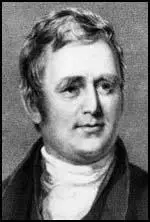Joseph Sturge

Joseph Sturge, the fourth of twelve children of Joseph Sturge (1763–1817) and his wife, Mary Marshall, was born at Elberton, Gloucestershire, on 2nd August 1793. After three years at the Quaker Sidcot School, Sturge at fourteen began farming with his father.
In 1814 he settled at Bewdley but his farm was not a success. In 1822 he moved to Birmingham and went into partnership with his brother Charles Sturge (1801–1888) and eventually it became one of the largest grain-importing businesses in Britain. He also invested in the growing railway industry.
Sturge was a member of the Society of Friends and became involved in the campaign against slavery. In 1823 James Cropper, Sturge's father-in-law, wrote to Zachary Macaulay suggesting the formation of a new abolition society. According to the author of The Great Abolition Sham: The True Story of the End of the British Slave Trade (2005): "Its strategy first and foremost would be to obtain information on the state of slavery in British and foreign colonies in the West Indies and in North and South America, in order to prove the argument that free labour was cheaper than slave labour but that the expense of cultivation would also be lessened by the amelioration of the hard treatment of slaves."
Later that year Sturge, Cropper, Thomas Clarkson, Thomas Fowell Buxton, William Allen, and Zachary Macaulay to form the Society for the Mitigation and Gradual Abolition of Slavery. Clarkson agreed to take to the road again to resurrect the old abolition network of some 70 local bodies and to establish new ones. Cropper offered Clarkson £500 to pay for the campaign.
In his book, The Great White Lie (1973), Jack Gratus argues that: "The plan was to divide the country into districts, and to send a lecturer to each, armed with facts and information about slavery and fired by an enthusiasm to convert new audiences around the country to emancipation. The Quakers accepted the idea immediately and Cropper advanced £500 out of his own pocket. The prosperous Birmingham Quaker, Joseph Sturge, who was to play such an important role in the later history of emancipation, advanced £250. Wilberforce gave £20 and James Stephen ten guineas."
Sturge disagreed with Thomas Fowell Buxton and other leaders of the movement, who argued for a policy of gradual emancipation. At the conference in May 1830, the Anti-Slavery Society agreed to drop the words "gradual abolition" from its title. It also agreed to support Sarah Wedgwood's plan for a new campaign to bring about immediate abolition. The following year the Anti-Slavery Society presented a petition to the House of Commons calling for the "immediate freeing of newborn children of slaves".
In 1831 Sturge and his father-in-law, James Cropper, formed the Young England Abolitionists, a pressure group within the Society for the Abolition of Slavery, that campaigned for a new act of Parliament. It was distinguished from other anti-slavery groups by its unconditional arguments and vigorous campaigning tactics. Peter Archer has argued that they directed "their activities much more in the direction of forming mass opinion."
The Abolition of Slavery Act was passed on 28th August 1833. Sturge was disappointed by the measure that granted compensation to slave owners and substituting a temporary system of unpaid apprenticeship for slavery. Sturge visited the West Indies (November 1836 to April 1837) where he collected evidence to demonstrate the flaws in the legislation. On his return he published The West Indies in 1837 and gave evidence for seven days before a committee of the House of Commons. As a result of his campaign in 1838 the apprenticeship system was terminated.
Slavery in the United States (£1.29)
Sturge founded the British and Foreign Anti-Slavery Society in 1839, and organized an international anti-slavery convention in 1840. In 1841 he travelled through the United States with the poet John Greenleaf Whittier, to observe the condition of the slaves there, and on his return published A Visit to the United States in 1841 (1842).
Sturge was also a supporter of the Anti-Corn Law League and Chartism. In 1842, he launched a campaign for "complete suffrage", hoping to secure the co-operation of the league and the Chartist movement under his leadership. He received some support from some leaders such as Henry Vincent, but the league leaders refused to participate, and the movement faded away after it was opposed by William Lovett and Feargus O'Connor at a conference in Birmingham in December 1842.
His first wife, Eliza Cropper, the daughter of James Cropper, died in 1835. He married Hannah Dickinson of Coalbrookdale on 14th October 1846, with whom he had a son and four daughters. Two of his children, Joseph and Sophia also became involved in his campaign for social reform.
His sister, Sophia Sturge, joined forces with Lucy Townsend, Elizabeth Heyrick, Mary Lloyd, and Sarah Wedgwood, to form the Birmingham Ladies Society for the Relief of Negro Slaves (later the group changed its name to the Female Society for Birmingham). The group "promoted the sugar boycott, targeting shops as well as shoppers, visiting thousands of homes and distributing pamphlets, calling meetings and drawing petitions."
Surge was a pacifist and an active member of the Peace Society. According to his biographer, Alex Tyrrell: "For several years after the mid-1840s Sturge was one of the leaders of a movement for people diplomacy, which attempted to create an international public opinion in favour of arbitration as a means of avoiding war. Together with Richard Cobden, Henry Richard, Elihu Burritt, and others, he organized peace congresses at Brussels, Paris, Frankfurt, London, Manchester, and Edinburgh. In 1850 he visited Schleswig-Holstein and Copenhagen with the object of inducing the governments of Schleswig-Holstein and Denmark to submit their dispute to arbitration. In January 1854 he was appointed one of the deputation from the Society of Friends to visit the tsar of Russia in an attempt to avert the Crimean War."
Joseph Sturge died of a heart-attack at Edgbaston on 14th May 1859.

